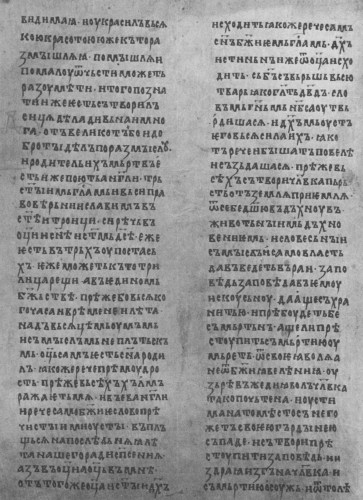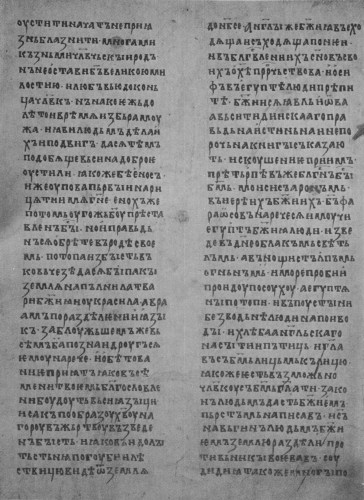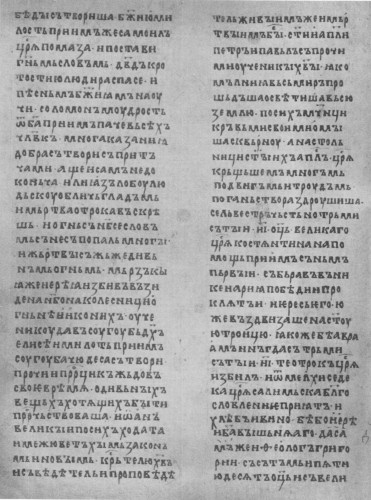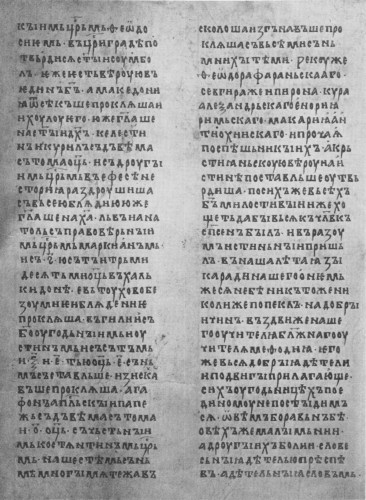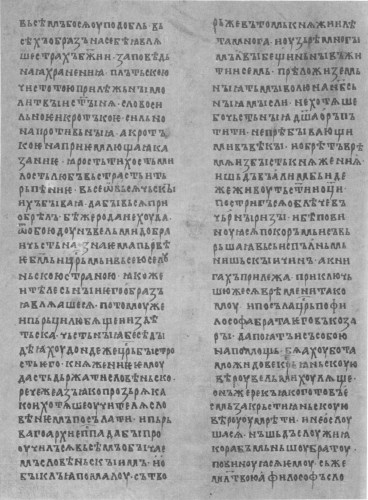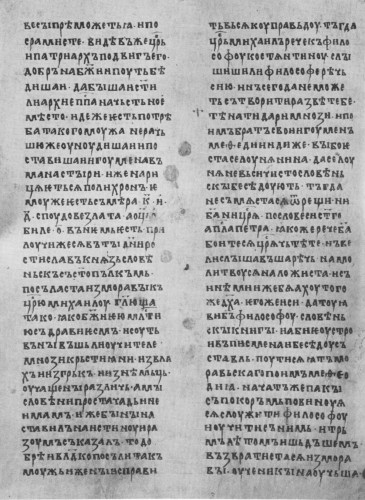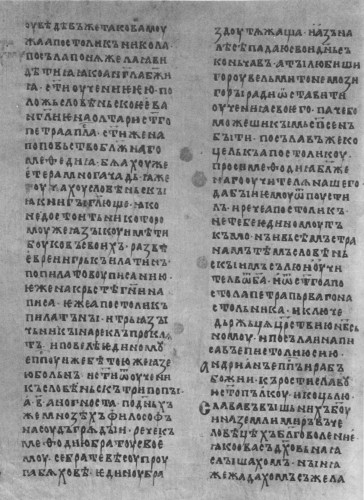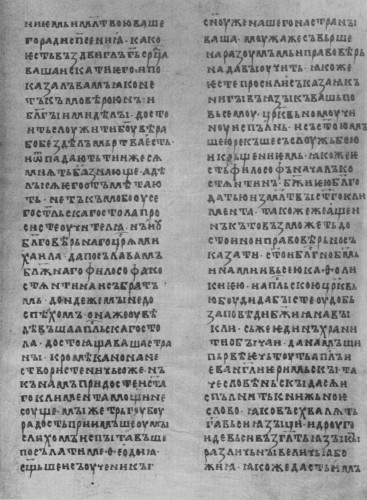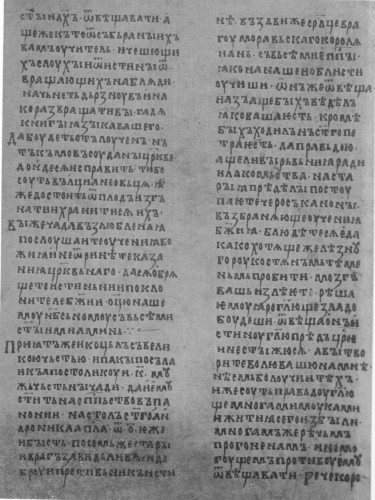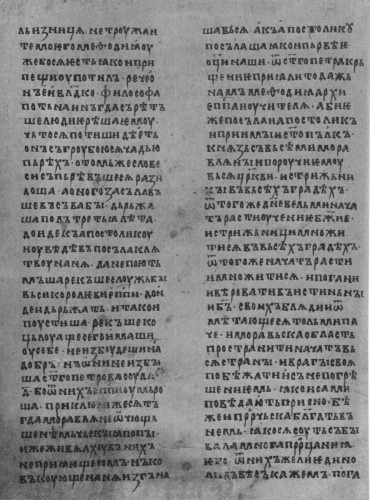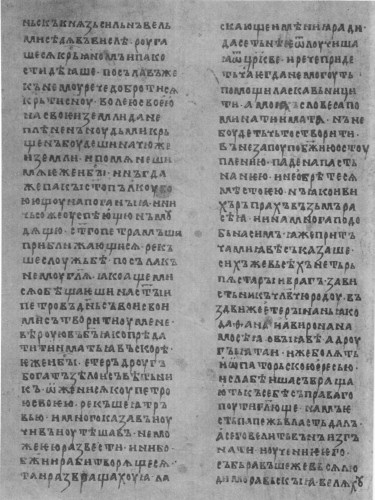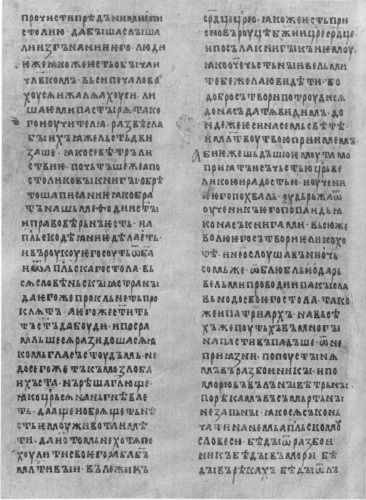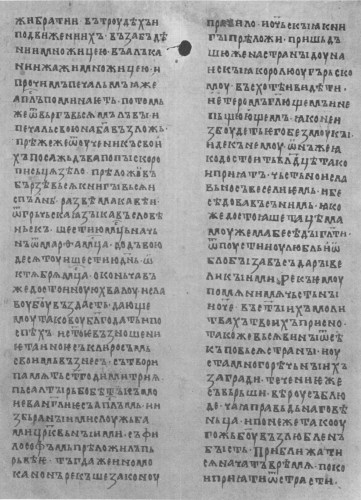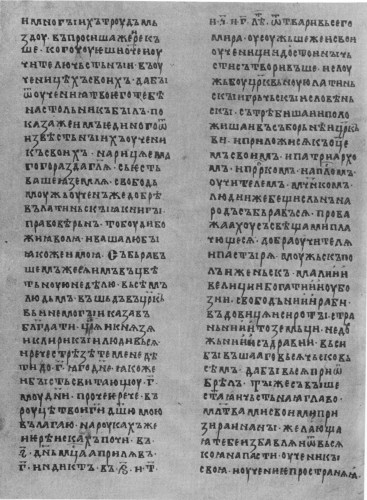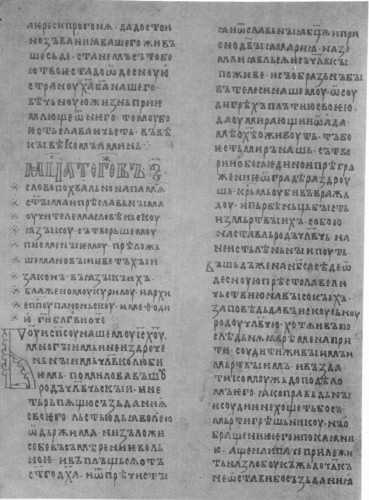THE LIFE OF METHODIUS
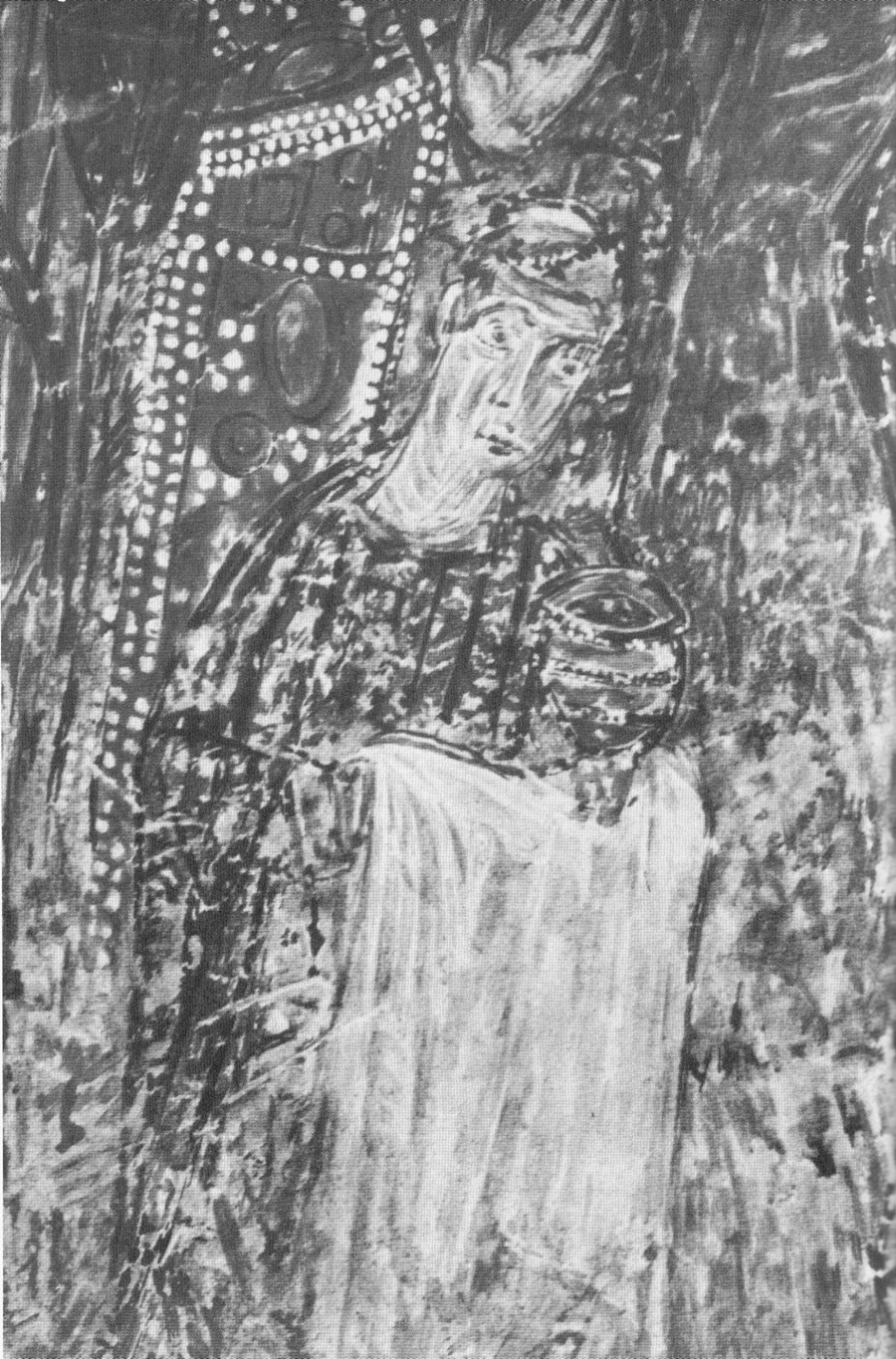
St. Methodius (XI-century fresco)
- __1_
- __2_
- __3_
- __4_
- __5_
- __6_
- __7_
- __8_
- __9_
- __10_
- __11_
- __12_
- __13_
- __14_
- __15_
- __16_
- __17_
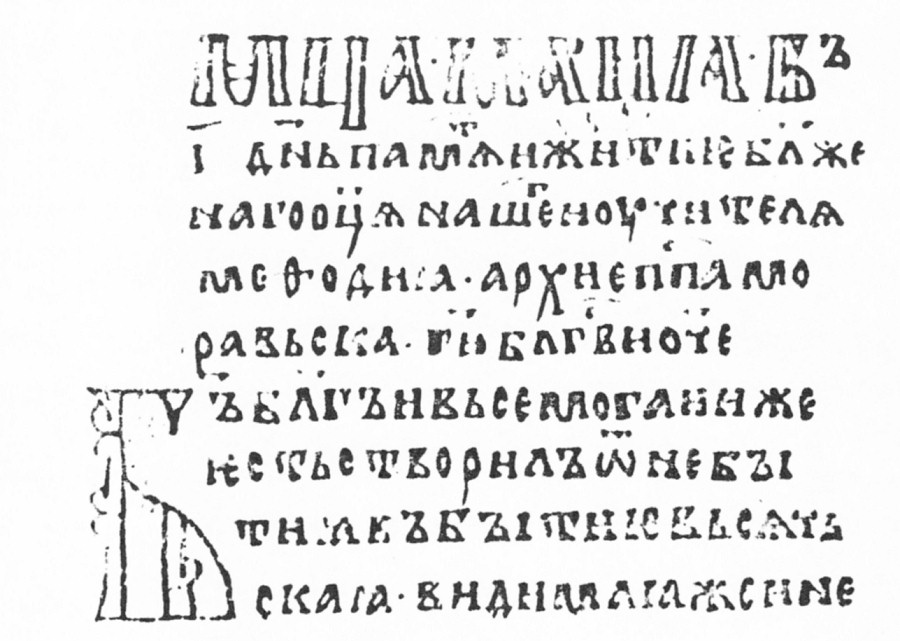
THE MONTH OF MAY ON THE TENTH DAY
Commemoration and Vita
of Our Blessed Father and Teacher
Methodius, Archbishop of Moravia.
Bless us Lord, Our Father.
Gracious and almighty is God, who from non-being called into being all things visible and invisible,
99
![]()
![]()
100
![]()
101
and adorned them with all beauty, so that he who contemplates it with reverence might in time perceive and recognize the One who called forth such abundant and wondrous works. For in reflecting upon the greatness and goodness of the works, one senses their Maker, [1] whom the angels praise in thrice-holy voices, and all we Orthodox glorify in the Holy Trinity, namely, in the Father, the Son, and the Holy Spirit, that is, in three hypostases —which can be called three Persons—but in one Deity. [2] Thus, before any hour, age, or time, beyond all understanding and incorporeal perception, [3] the Father himself brought forth the Son, as the Proverbs say: “Before all the hills was I brought forth.” (Proverbs 8:25) And in the Gospel the Divine Word, which later became flesh for the sake of our salvation, was spoken through His most pure mouth: (John 14:11) “I am in the Father, and the Father in Me.” The Holy Spirit also proceeds from that same Father, as the Son himself said in a divine voice: “The Spirit of Truth, which proceedeth from the Father.” (John 15:26) This God perfected all creation, as David says: “By the word of the Lord were the heavens made; and all the host of them by the breath of His mouth. For He spake and it was done; He commanded, and it stood fast.” (Psalm 33:6) (Psalm 33:9) Before all else He created man. Taking the dust of the ground, He breathed a soul into it from His life-giving breath, [4] as well as understanding of the Word, and free will, so that he might be led into paradise. As a test a commandment was commanded unto him: If he kept it, he would remain immortal; if he transgressed it, he would die through death by his own will, and not by God’s command. Now, when the Devil saw man so honored and urged to the place from which he had fallen through his own pride, he caused him to transgress the commandment. And God drove man out of paradise, condemning him to death.
Henceforth the Adversary began to ply and plague mankind with his many wiles. Nevertheless, in His great mercy and love, God did not abandon man totally, but in every age and time He chose men and revealed their deeds and struggles to people,
![]()
102
![]()
103
that all might imitate them and be drawn to the good. [5] Such was Enoch, who was first to have faith and call out the name of the Lord. And then Enoch pleased God, and was translated. [6] (Sirach 44, 16) Noah was found righteous in his generation, [7] (Sirach 44, 17) and was delivered from the Flood in the ark, that the earth might again be bountiful and adorned with God’s creatures. Abraham recognized God after the division of nations when all were in error. And he was called His friend and received the promise: “In thy seed shall all the nations be blessed.” (Genesis 22, 18; 26, 4) Isaac, foretokening Christ, was brought up the mountain as an offering. [8] Jacob destroyed the idols of his father-in-law; and he saw a ladder from the earth to heaven on which the angels of God were ascending and descending. And in the blessing of his sons he prophesied about Christ. [9] Joseph nourished the people in Egypt, having shown himself to be godly. [10] The Scriptures tell that Job of Ausitis was righteous, truthful, and blameless. Having experienced temptation, he endured and was blessed by God. [11] Moses was with Aaron among God’s priests to be named a god to Pharoah. [12] And he plagued Egypt, and led God’s people out by day in a bright cloud, and by night in a pillar of fire. [13] He divided the sea and they passed through it upon the dry ground; but he drowned the Egyptians. [14] And in the waterless wilderness [15] he gave the people water to drink, and sated them with birds and the bread of angels. [16] Then, having spoken with God face to face — in so far as it is possible for a man to speak with God — he gave the people the law, which was written with the finger of God. [17] Jesus the son of Nave warred against the enemy, and distributed land to God’s people. [18]
The judges also gained many victories. Receiving God’s grace, Samuel anointed the king, and established him according to the word of the Lord. [19] David shepherded the people with gentleness, and taught them God’s songs. [20] Solomon, receiving more wisdom from God than any other man, composed many good proverbs with parables, though he himself accomplished
![]()
104
![]()
105
them not. [21] Elijah punished the malice of the people through hunger, and resurrected a dead youth. And by his word he brought fire down from heaven, which burnt many, and consumed the offerings in a miraculous fire. Then, having killed the abominable priests and given his disciple a double spirit, he ascended to heaven in a chariot of fire with horses of fire. [22] Elisha, having received the mantle, wrought double miracles. [23] Other prophets, each in his time, prophesied miraculous things that would come to pass.
After these came John, the great mediator between the Old and the New Covenants, the Baptist of Christ, witness and preacher for the living and the dead. [24] The Holy Apostles Peter and Paul, together with the other disciples of Christ, passed through the whole world like lightning and illuminated the entire earth. After them the martyrs washed away defilement with their own blood, while the successors of the Holy Apostles baptized emperors and destroyed paganism through their many struggles and labors.
Just as Abraham once destroyed kings with three hundred and eighteen youths and received a blessing, bread, and wine from Melchizedek, King of Salem, [25] so the venerable Sylvester, taking the Emperor Constantine the Great as his aid and convening the first Council of Nicaea, defeated Arius with three hundred and eighteen Fathers, and condemned him and the heresy he began against the Holy Trinity. [26] For he was a priest of God On High. Then Damasus and Gregory the Theologian, along with one hundred and fifty Fathers and the great
![]()
106
![]()
107
Emperor Theodosius confirmed the Holy Creed in Constantinople, that is, “I believe in one God.” They excommunicated Macedonius and condemned him and the blasphemy he was speaking against the Holy Spirit. [27] Celestine and Cyril along with two hundred Fathers, and another Emperor defeated Nestorius at Ephesus and all the lies he was speaking against Christ. Leo, Anatolius and the Orthodox Emperor Marcian along with six hundred and thirty Fathers condemned the foolishness and falsity of Eutyches at Chalcedon. [28] Virgilius and the pious Justinian along with one hundred and sixty-five Fathers convoked the Fifth Council investigated and condemned... [29] The Apostolic Pope Agatho along with two hundred and seventy Fathers and the venerable Emperor Constantine suppressed many rebellions at the Sixth Council. They condemned and drove the rebels out, that is, Theodoret of Pharan, Sergius and Pyrrhus, Cyrus of Alexandria, Honorius of Rome, Macarius of Antioch, and the rest of their followers, along with all those who were at the council. [30] However, they strengthened the Christian faith, basing it on Truth.
And after all these, merciful God, who will have all men to be saved and to come unto the knowledge of the truth, (I Timothy 2:4) roused our teacher, the blessed Methodius, to a good deed in our age for the sake of our people about whom none had ever cared. And we are not ashamed to compare all his virtues and struggles one by one with those of these pious men. For he was the equal of some, less than others, but greater than still others, surpassing the eloquent in his energy, and the energetic in his eloquence.
![]()
108
![]()
109
Being similar to all, he revealed in himself the image of all: fear of God, observance of commandments, zealous prayers with purity of the flesh, and piety, forceful and gentle speech —forceful for opponents, gentle for those accepting instruction —fury, mildness, mercy, love, passion, and patience, being all things to all so that he might gain all. [31]
He was not of mean origin on either side, but of a very good and venerable one, which was known first and foremost to God and the Emperor, as well as to the entire region of Thessalonica, and which was also revealed in his physical appearance. Therefore, the notables who loved him from childhood spoke reverently of him, until the Emperor, having recognized his keen mind, gave him a Slavic principality to rule. [32] And I say that he, as if foreseeing that he would send him as teacher and first Archbishop to the Slavs, wished him to learn all the Slavic customs, and gradually become accustomed to them.
After spending many years in that principality and witnessing the excessive, disorderly tumult of this life, he exchanged his inclination toward earthly darkness for heavenly thoughts. For he wished not to disturb his precious soul with transient matters and, upon finding the opportunity, he left the principality. Going to Olympus where the holy fathers live, [33] he was tonsured, and he put on the black habit. He obediently submitted to and fulfilled completely all the monastic rules, and applied himself to the Scriptures.
And when the right time came, the Emperor sent for the Philosopher, his brother, that he might take him along to Khazaria [34] as an aide. For Jews were there who were blaspheming the Christian faith beyond measure. Then Methodius said: [35] “I am prepared to die for the Christian faith.” Thus he did not refuse but went, serving his younger brother, obeying him like a slave. And they defeated and shamed them, he through prayer, the Philosopher through eloquence.
![]()
110
![]()
111
Seeing his righteous struggle for God’s way, the Emperor and Patriarch tried to convince him to be consecrated archbishop of an honorable place where such a man was needed. Since he did not agree, they forced him, making him hegumen of the monastery called Polychron, which had a value of twenty - four measures of gold, and more than seventy fathers. [36]
And it came to pass in those days that the Slavic Prince Rostislav together with Svatopluk sent emissaries from Moravia to Emperor Michael, [37] saying thus: “We have prospered through God’s grace, and many Christian teachers have come to us from among the Italians, Greeks and Germans, teaching us in various ways. But we Slavs are a simple people, and have no one to instruct us in the truth, and explain wisely. Therefore, O kind lord, send the type of man who will direct us to the whole truth.”
Then Emperor Michael said to Constantine the Philosopher: “Do you hear this matter, Philosopher? None other than you can do this. Elere then are many gifts. Take your brother, the Hegumen Methodius, and go. For you are both Thessalonians and all Thessalonians speak pure Slavic.” [38]
Then they dared not refuse God or the Emperor, following the words of the Holy Apostle Peter, who said: “Fear God. Honor the king.” (I Peter 2:17) Having eagerly listened to the matter, they began to pray with those who were of the same spirit as they. And then God revealed the Slavic script to the Philosopher. And immediately after forming an alphabet and composing the text, [39] he set out for Moravia, taking Methodius along. Once again he began to serve the Philosopher in humble obedience, and to teach with him. And when three years had passed, both returned from Moravia, having trained disciples. [40]
![]()
112
![]()
113
When he learned of these two men, the Apostolic Father, Nicholas, [41] sent for them, wishing to see them as much as the angel of God. He consecrated their teachings, placing the Slavic Gospel on the altar of the Holy Apostle Peter. He also consecrated the blessed Methodius to the priesthood. But there were many other people who reviled the Slavic Scriptures, saying: “Except for the Jews, Greeks, and Latins, it is improper for any people to have their own letters, according to the inscription which Pilate had written on the Lord’s cross.” [42] Calling them Pilatists and trilinguists, the Apostolic Father condemned them. He commanded a bishop, who was afflicted with the same disease, to consecrate three of the Slavic disciples as priests, and two as lectors.
And after many days, the Philosopher, nearing Judgment, said to Methodius, his brother: “Behold, brother, the two of us have been yokemates, plowing the same furrow. Now my days are ending and I am falling on the field. Though you have great love for the mountain, [43] still leave not your teaching for the mountain’s sake, for you can sooner be saved through it.”
Then Kocel [44] sent to the Apostolic Father, asking him to delegate our blessed teacher Methodius to him. And the Apostolic Father said: “Not only to you alone but to all the Slavic lands do I sent him, a teacher from God and the Holy Apostle Peter, the first successor and keeper of the the keys to the heavenly kingdom.” And he sent Methodius after writing this epistle: “Hadrian, [45] Bishop and servant of God to Rostislav, Svatopluk, and Kocel: Glory to God in the hightest, on earth peace, goodwill toward men. (Luke 2:14) We have heard of your spirituality and eagerly
![]()
114
![]()
115
desire and pray for your salvation; and how the Lord moved your hearts to seek Him, and showed you that it is fitting to serve God not only through faith, but also through good works. For faith without works is dead, and they fall away who profess to know God, but deny Him in works. [46] You have asked for a teacher not only from this Holy See, but also from the pious Emperor Michael. And he sent you the blessed Philosopher Constantine together with his brother before we managed to. But when they learned that your lands belonged to the Apostolic See, [47] they did nought against canon, but came to us bearing the relics of Saint Clement. Deriving threefold joy therefrom, we considered the matter and decided to send to your lands our son Methodius, an Orthodox man accomplished in mind, whom we consecrated with his disciples in order to teach, as you requested, and to explain fully in your language the Scriptures and holy Mass, that is, the liturgy, [48] as well as Baptism according to the entire Church Office, just as Constantine the Philosopher had begun through the grace of God and the prayers of Saint Clement. Likewise, if there be someone else who is able to explain properly and faithfully,may this be holy and blessed by God, by us, and by the entire Catholic and Apostolic Church, so that God’s commandment be easily learned. But keep this one custom: during Mass read the Apostolos [49] and Gospel, first in Latin, then in Slavic, that the word of the Scripture might be fulfilled: ‘Praise the Lord, all ye nations;’ (Psalms 117:1) and elsewhere, ‘all the different tongues shall proclaim the greatness of God as the Holy Spirit gave them utterance.’ [50] But if one of the teachers called to you, or one of those who tickle the ears and who turn from the Truth to lies [51] dares, and begins in another manner to corrupt you, reviling the writings of your tongue, may he be cut off not only from communion, but also from the Church until he rights himself. [52] For they are not sheep but wolves whom you shall know by their fruits and avoid. [53] And you, O beloved children, obey God’s teaching and reject not the Church’s instruction, that you might be true worshipers of God, our heavenly Father, and all the Saints. Amen.”
Then Kocel received Methodius with great
![]()
116
![]()
117
honor. And he sent him again, and twenty men of venerable descent, to the Apostolic Father in order to be consecrated to the bishopric of Pannonia, to the seat of Saint Andronicus, an Apostle of the seventy. [54] And so it came to pass.
And after this, the old enemy, the envier of good and adversary of truth, inclined the heart of the Moravian King and all the bishops toward the enemy and against Methodius. And they said to him: [55] “You are teaching in our territory.”
But he answered: “If I had known it was yours, I would have remained far away; but it is Saint Peter’s. Verily, if you, out of jealousy and greed, transgress canon for the old boundaries, [56] and prohibit God’s teaching, beware, lest you spill your brains in wishing to pierce an iron mountain with a skull of bone.”
They said to him sternly: “You shall come to evil.”
He answered: “I speak the Truth before emperors and am not ashamed. But work your will upon me. For lam no better than those who lost their lives through many torments for speaking the Truth.”
And when they had exhausted many words and could no longer answer him, the King said deviously, “Do not trouble my Methodius, for he is already covered with sweat as though he were next to a stove.”
He said: “Yea, O lord. Once some people met a sweating philosopher and said to him, ‘Why are you sweating?’ And he replied, ‘I have been debating with crude people.’ ”
![]()
118
![]()
119
After quarreling about this remark, they parted. However, they banished Methodius to Swabia, and detained him for two and a half years.
News of this [57] reached the Apostolic Father. Having heard of it, he sent an interdict against them, [58] that all the King’s bishops could not celebrate the Mass, that is, the liturgy, for as long as they detained Methodius. So they released him, saying to Kocel: “If you keep this man with you, you shall not escape easily from us.”
But they did not escape the judgment of Saint Peter, as four of these bishops died. [59] And it then came to pass that the Moravians drove out all the German priests who were living among them, sensing that they did not accept them but forged discord against them. And they sent to the Apostolic Father, saying: “Since our fathers once received Baptism from Saint Peter, [60] give us Methodius as archbishop and teacher.”
And the Apostolic Father sent him at once. And Prince Svatopluk and all the Moravians received him. They entrusted to him all the churches and clergy in all the towns. And from that day forth, God’s teachings grew greatly and the clergy multiplied in all the towns. And for that reason the Moravians [61] began to grow and multiply, and the pagans to believe in the true God, casting aside their lies. And the Province of Moravia began to expand much more into all lands and to defeat its enemies successfully, as they themselves are always relating.
Methodius also possessed the gift of prophesy, for many of his prophesies came to pass. We shall relate one or two of these.
A very powerful pagan prince settled on the Vistula and began mocking the Christians and doing evil. Communicating with him, Methodius said: “My son, it would be better for you to be baptized of
![]()
120
![]()
121
your own will in your own land, so that you will not have to be baptized against your will as a prisoner in a foreign land; [62] and remember me.” And so it came to pass.
Again, another time: When Svatopluk was warring without success against the pagans and faltering, and Saint Peter’s Day Mass, that is, the liturgy drew nigh, [63] Methodius sent to him, saying: “If you promise me that you and your soldiers will celebrate Saint Peter’s Day with me, I trust God will soon deliver them to you.” And so it came to pass.
A certain very wealthy friend and councilor of the Prince [64] married his fellow godparent, that is, his brother’s wife. [65] After much explaining, instructing and comforting, Methodius was unable to separate them; for others, pretending to be God’s servants, secretly corrupted them, deceiving the couple for their property and, in the end, separated them from the Church. And Methodius said: “There will come a time when deceivers will not be able to help you; and you will recall my words, but there will be nothing to do.” Suddenly, after God abandoned them, calamity befell them, and their place was not to be found. But as the whirlwind raises the dust, they were scattered [66].
And there were many instances similar to these which he explained through parables.
Unable to bear all this, the Old Enemy, the Envier of Mankind, incited certain people—some overtly, others covertly — against Methodius as did Dathan and Abiram against Moses. Being afflicted by the hyiopateric heresy, they turned the weakest toward themselves and away from the true path, saying: “The Pope empowered and commanded us to drive out this man and his teaching.” [67]
And upon assembling all the Moravian people,
![]()
122
![]()
123
they ordered the epistle read in their presence, that they might hear of Methodius’ expulsion. And as is man’s wont, all the people — save the weak whom deceit moves as wind the leaves — were grieved and mourned the loss of such a shepherd and teacher. But when they read the Apostolic Father’s epistle, they found written: “Our brother Methodius is blessed and Orthodox, and is doing the work of the Apostolic See. And from God and the Apostolic See are all the Slavic lands in his hands. Thus, whomever he curses is cursed; but whomever he blesses, may he be blessed.” [68] leaving been shamed, in shame they dispersed like the mist.
But their malice did not stop at this alone, for they spoke, saying: “The Emperor is angry with Methodius, and if he finds him, he will lose his life.”
Not wishing His servant profaned, merciful God stirred the Emperor’s heart, for the Emperor’s heart is always in God’s hand. [69] And he sent an epistle to Methodius:
“Venerable Father: I wish very much to see you. Be so kind as to trouble yourself to come to us, so that we might see you while you are still in this world, and receive your prayer.” [70]
He went there at once, and the Emperor received him with great honor and joy. And he praised his teaching, and retained a priest and a deacon from among his disciples, and books. And he fulfilled whatever Methodius desired, refusing him nothing.
Then the Emperor embraced him and gave him many gifts. And he accompanied Methodius again with honor to his see, as did the Patriarch. [71]
On all his journeys he met with many perils because of the Adversary: in the wilderness with robbers, at sea with windblown waves, and on rivers with imminent death. Thus, the words of the Apostle were fulfilled in him: “Perils of robbers, perils in the sea, perils on rivers, perils among false (2 Cor. 11:26-27)
![]()
124
![]()
125
brethren, in weariness and painfulness, in watchings often, in hunger and thirst often,” [72] and other cares which the Apostle mentions.
Afterwards, rejecting all the tumult and placing his sorrow upon God, he first took from among his disciples two priests who were excellent scribes and translated quickly from the Greek language into Slavic—in six months [73] beginning with the month of March to the twenty-sixth day of the month of October—all the Scriptures in full, save Maccabees. And upon finishing, he rendered due thanks and praise unto God, Who grants such grace and success, and performed together with his clergy the elevation of the blessed Mystery, celebrating the memory of Saint Demetrius. [74] For previously he had translated with the Philosopher only the Psalter, the Gospel together with the Apostolos, and selected church liturgies. And then he translated the Nomocanon, that is, the Rule of the Law, and the Books of the Fathers. [75]
Then the King of Hungary [76] came to the lands of the Danube, Methodius wished to see him. And though some were assuming and saying: “He will not escape torment,” Methodius went to him. And as befits a sovereign, he received him with honor, solemnity, and joy. Having conversed with him as befits such men to converse, he dismissed him with an embrace and many gifts. Kissing him, he said: “O venerable Father, remember me always in your holy prayers.”
Thus, after cutting short all accusations on all sides and stopping the mouths of the garrulous, [77] he completed the course of life, keeping the faith and awaiting the crown of righteousness. [78] And since he was so pleasing to God, he was loved. The time drew nigh for accepting respite from suffering,
![]()
126
![]()
127
and reward for many labors. And they asked him, saying: “O Father and venerable teacher, whom of your disciples do you consider the successor to your teaching?”
He pointed out to them one of his trusted disciples named Gorazd, saying: “He is a free countryman of yours who is Orthodox and well versed in Latin letters. May this be God’s will and your desire, as it is mine.” [79]
When all the people gathered on Palm Sunday, he entered the church a sick man. And after instructing that blessings be given to the Emperor, the Prince, the clergy, and all the people, he said: “My children, watch over me until the third day.” And so it came to pass. And when the third day dawned, he further said: “Lord, into Thy hands I commend my spirit.” (Luke 23,46)
And he passed away in the arms of priests on the sixth day of the month of April, in the third indiction, 6393 years [80] from the creation of the whole world. After laying out his body, his disciples rendered due honors: They celebrated the church service in Latin, Greek and Slavic, and placed him in the cathedral church. [81] And he was laid to rest unto his Fathers, [82] unto the patriarchs and prophets, unto the apostles, teachers and martyrs. An innumerable crowd of people gathered — men and women, great and small, rich and poor, freemen and slaves, widows and orphans, foreigners and countrymen, the ailing and the healthy - and accompanied him with candles, mourning their good teacher and shepherd, who was all things to all, so that he might gain all. [83]
O holy and venerable Head, look thou from on high in thy prayers upon us who desire thee, deliver thou thy disciples from all danger, spread thy
![]()
128
![]()
129
teaching and dispel the heresies, so that, having lived here worthy of our calling, we, thy flock, might stand with thee at the right side of Christ Our God, receiving eternal life from Him. And unto Him glory and honor forevermore. Amen.
Notes to the Vita of Methodius
1. This passage appears to be a paraphrase of the Wisdom of Solomon 13:5: “For by the greatness and beauty of the creatures proportionably the Maker of them is seen.” In the original Slavic text this sentence reads: Ot” velikoty bo i dobroty děl”po razmyslu i roditel’ix” m’rtv” est’..., which would translate verbatim as, “For in reflecting on the greatness and goodness of the works, their Maker is dead.” Obviously some error has occurred which renders the sentence rather senseless. The translation, therefore, follows the correction suggested by Bodjanskij, i.e., replacing m’rtv”est’ with mudr’stvujet’ sę (see Lavrov, Materialy, p. 67).
2. The Slavic text employs the Greek term hypostases (oupostas). In theological terminology the hypostases are the three real and distinct subsistences in the one undivided substance of God.
3. The term “incorporeal perception” probably refers to the Heavenly Host. The author is presenting a hierarchical arrangement, i.e., that the Son was brought forth before all time, which is incomprehensible to man and angels alike.
4. The description of man’s creation is taken from Genesis 2:7: “And the Lord God formed man of the dust of the ground, and breathed into his nostrils the breath of life: and man became a living soul.” Cf. Genesis 2:15-17.
5. The format for the ensuing praise of certain holy men, viz., Enoch, Noah, Abraham, Isaac, Jacob, Moses, Aaron, Jesus the son of Nun, Samuel, David, Solomon, Elijah (Elias) and Elisha (Eliseus), seems to be based on Sirach (Ecclesiasticus), Chapters 44—48.
6. Cf. Genesis 5:24 and Hebrews 11:5.
7. Cf. Genesis 6:9,7:1, and Hebrews 11:7.
8. Cf. Genesis 22:2.
9. Cf. Genesis 35:2-4,28:12,48:8-22, and 49:8-12.
10. Cf. Genesis 41,47:12.
11. In the King James Version of the Bible, Job is referred to as “a man in
![]()
130
the land of Uz.” The place name in the Slavic text is derived from the Greek Septuaginta, viz., Ausitis (cf. Job 1:1,42:12).
12. In Exodus 7:1 we read: “And the Lord said unto Moses, See, I have made thee a god to Pharoah; and Aaron thy brother shall be thy prophet.”
13. Cf. Exodus 13:21 and Psalm 78:14.
14. Cf. Exodus 14:21,14:29, and Psalm 78:13.
15. The expression “in the waterless wilderness” (v poustyni bezvodne) is translated literally. This obviously is a Slavic circumlocution for desert. Note that Slavic poustyni can mean both ‘desert’ and ‘wilderness’ (see Miklosich, Lexicon, p. 755).
16. Cf. Exodus 16:4,17:6, and Psalm 78:25.
17. Cf. Exodus 31:18, 33:11.
18. Cf. Sirach 46:1. Note that Jesus the son of Nun is synonymous with Joshua the son of Nun (see Numbers 27:18, Deuteronomy 34:9 and Joshua 12:7).
19. Cf. I Samuel 10:1 and Sirach 46:13.
20. Cf. Sirach 47:2-10.
21. Cf. Sirach 47:13-20.
22. Cf. Sirach 48:1-2; I Kings 17:23, 18:38-40; II Kings 1:10-14, 2:9-11.
23. Cf. II Kings 2:13-15.
24. Cf. Mark 1:4-9.
25. Cf. Genesis 14:14-18.
26. The First Council of Nicaea was convened in 325 by Constantine the Great in an effort to put an end to the Arian controversy, which was raging in the Eastern Church. Arius (250—336), a priest from Alexandria and the founder of Arianism, professed that Christ was not divine, since He was created by the Father. Arius believed that God the Father was unique in that He was immutable and self-existent. However, the Son was brought into being by the Father and was mutable, since He grew and changed as a man. Thus Arius concluded that Christ was not divine, since He was not coeternal with the Father but rather a creature created by the Father.
There is no extant account of the proceedings of the Council of Nicaea but the Nicene Creed and twenty canons have been preserved. It is thought that 200 bishops attended the Council and that the number in the Vita, though frequently associated with the Council, is fanciful and based on the biblical reference cited therein. Pope Sylvester (314—335) did not attend the Council but delegated two Roman priests to it. In all, no more than five bishops from the Latin West were present.
The Nicene Creed attempted to answer the charges that the Arians had advanced against the Son as a divinity. It stated that the Son was “of one substance with the Father” (homoousion toi patri). In clear reference to the Arians, anathemas were added to the Creed: “But for those who say, There was when he was not, and, Before being born he was not, and that He came into existence out of nothing, or assert that the Son of God is of a different hypostasis or substance, or is created, or is subject to alternation or change—these the Catholic Church anathematizes.”
![]()
131
27. The first Council of Constantinople was convened by Emperor Theodosius I (379—395) in 381 and, according to historical sources, was attended by 150 church figures, as the author of the Vita indicates. At this Council the Nicene Creed (more properly, the Nicene-Constantinopolitan Creed) was promulgated. It put to rest the arguments concerning Trinitarian teachings. In answer to the Arian belief that the Son, Christ, was not divine but mutable, not eternal but called into existence, the Creed declared: “I believe in one God, the Father Almighty, maker of heaven and earth, of all things visible and invisible; and in one Lord Jesus Christ, the only begotten Son of God, begotten from the Father before all ages, light from light, true God from true God, begotten not made, of one substance with the Father...”
Pope Damasus (366—384) did not attend the Council nor was he represented. However he accepted the Creed. Saint Gregory of Nazianzus (?330—395), “the theologian” (see note 6 in the Vita of Constantine), was elected President of the Council. Macedonius was elected Patriarch by the Arian bishops in 341, deposed in 348, and reinstated in 350. Indeed, his up-and-down career is representative of the struggle between the Arians and the adherents of the Nicene Creed. In 359 the Arians split into two groups: the pure Arians and the Homoiousians. Macedonius adhered to the latter group and as a result was deposed again in 360. Later he led a sect called Pneumatomachi (Fighters against the spirit), which is also referred to as the Macedonian sect. They believed the Holy Spirit was on a level with angels and therefore subordinate to both Father and Son. The Macedonians were answered directly in the Nicene-Constantinopolitan Creed, which declared the doctrine of equality of the Holy Spirit with the Father and Son: “... and in the Holy Spirit, the Lord and life-giver, who proceeds from the Father, who with the Father and Son is together worshiped and together glorified, who spoke through the prophets..."
28. The Council of Ephesus (431) was convened by Emperor Theodosius II (408—450) in order to deal with the Nestorians. Immediately after being consecrated Patriarch of Constantinople (428), the Syrian-born Nestorius began to surpress the Arian and Macedonian heresies. He was also against the common use of the title Theotokos (‘Mother of God’) in reference to Mary. In a sermon obviously influenced by Nestorius, one of his followers, Anastasius, remarked: “Let no one call Mary the mother of God, for Mary was a human being; and that God should be born of a human being is impossible.”
The dominant figure at the Council of Ephesus was Cyril of Alexandria, the city’s Patriarch from 412—444. In a transparent bid for power, he encouraged those who opposed Nestorius and wrote to Pope Celestine I (422—432) about the latter’s views. Celestine decided in favor of the title Theotokos in 430 and ordered Nestorius to cease his erroneous teachings or risk excommunication. Cyril met with some 200 bishops at the Council before Nestorius’ supporters, the bishops of Antioch, even arrived, and presented extracts from Nestorius’ writings as well as his own exposition on the hypostatic union of the two natures of Christ. As a result, Nestorius was deposed and exiled.
![]()
132
As concerns the doctrinal debates on the nature of Christ and the relation of manhood and the Godhead in Christ, the Council of Ephesus was not nearly as important as the Council of Chalcedon (451). It was convoked by Emperor Marcian (450—457) and attended by 520 bishops or their representatives. Pope Leo I (440—461) was represented by three bishops and two priests. Anatolius was Patriarch of Constantinople at the time of this Council, and an avowed enemy of Eutyches for the role he played in deposing his predecessor, Patriarch Flavian. Eutyches was Archimandrite of a monastery in Constantinople and maintained that Christ had one nature, that is, adhered to the theory of Monophysitism. Because of his adamant anti-Nestorian views, he refused to accept the compromise worked out by Cyril of Alexandria in 433, which reconciled the Alexandrine views with those of the Antiochian Fathers. Now the former accepted the term “union” in reference to the two natures of Christ, while the latter accepted the term Theotokos. Eutyches was condemned at the Synod convened in 448 by Patriarch Flavian after admitting that: “. ..our Lord was of two natures before the union, but after the union of one nature ...” The following year he managed to affirm his views and depose Flavian at the so-called Robber Synod. However he was re-condemned at the Council of Chalcedon. This Council approved the Nicene Creed as well as Cyril’s letters against Nestorius and Pope Leo’s work on the two natures of Christ, Tome, which was a direct rebuttal of Eutyches. Furthermore, it affirmed a Confession of Faith, which itself was, at least in part, a reply to the views of both Nestorius and Eutyches. For example, Mary was identified by the epithet Theotokos, and Christ described as: “... One and same Christ, Son, Lord, Only-begotten, made known in two natures, without confusion, without change, without division, without separation, the distinction of natures being in no way removed by the union ...”
29. The “fifth council” (historically known as the Second Council of Constantinople) was held in 553 under the leadership of the Patriarch of Constantinople, Eutychius, and attended by 165 bishops. After the Council of Chalcedon, the adherents of the Confession of Faith were unable to suppress the growth of Monophysitism. Emperor Justinian (527—565) attempted to make compromises with the Monophysites but faded. He then published an edict condemning them and their writings. At this point there is a lacuna in the manuscript; however we could insert the names of the condemned as Theodore of Mopsuestia, Theodoret of Cyprus, and Ibas of Edessa.
Though the author of the Vita insists upon naming the Pope of Rome as leading each council, the fact is that none of the Eastern councils were attended by him. Indeed, Pope Vigilius (537—555) took sanctuary in a church at Chalcedon and refused to attend the Council. He, along with sixteen bishops, also refused to condemn Theodore of Mopsuestia. Only in 554 did Vigilius accept the proceedings of this Council.
30. Because Monophysitism continued to flourish, the Patriarch of Constantinople Sergius (610—638) attempted to compromise with the dogmata promulgated at Chalcedon by introducing the doctrine of the single will of Christ, i.e., Monothelitism. It was approved in an edict issued by
![]()
133
Emperor Heraclius (610—641) who wished to bring the Monophysites back into the Byzantine fold. However, the new doctrine was rejected on all sides—by the Orthodox, the Monophysites, and the Romans. Though Pope Honorius (625—638) had supported the Monothelitic doctrine—he believed the human will of Christ was sinless and therefore not in conflict with the divine will—his successors rejected it.
In 680 Emperor Constantine IV (668—685) convened the “sixth council” (historically known as the Third Council of Constantinople). He and Pope Agatho (678—681) now hoped to put an end to Monothelitism. At the Council the Monothelitic view was presented by Macarius, the Patriarch of Antioch. It was declared in error and condemned; Macarius was excommunicated along with a number of other proponents of Monothelitism including Theodoret, Bishop of the monastery of Pharan, Sergius and Pyrrhus, Patriarchs of Constantinople, Cyrus, Patriarch of Alexandria, and Pope Honorius. Going even beyond the Confession of Faith at Chalcedon, the Council affirmed: “We also preach two natural wills in Him and two natural energies, without division, without change, without separation, without partition, without confusion ...”
31. This passage seems to allude to I Corinthians 9:22: “To the weak became I as weak, that I might gain the weak: I am made all things to all men, that I might by all means save some.”
32. Though the principality which Methodius ruled has not been ascertained, there is no particular reason for disregarding the biographer’s statement. Being the son of a drungarios (see Note 3 in the Vita of Constantine), he was certainly of the proper station to receive such an imperial appointment. In this regard, Grivec (p. 26) states that Methodius was archon of a Slavic province on the Bulgarian frontier, while Dvornik (p. 58) maintains that he became archon in the region around Thessalonica.
33. The reference here is to Mount Olympus in Asia Minor (see Note 29 in the Vita of Constantine). After forsaking his secular career, Methodius became a monk. In fact we find the following statement in a Liturgy to Methodius (see Lavrov, p. 123):
“Having forsaken thy people and fatherland, thy wife and children, O blessed teacher, thou chose to live in the wilderness with the holy fathers...”
Grivec (p. 26) states that Methodius entered the monastery in 840 for reasons related to the Iconoclastic movement. It would seem that Grivec’s date is incorrect. The Vita relates that Methodius spent “many years” as archon before entering the monastery. Since in Byzantium most young men of rank received instruction until their twenties (see “Byzantine Education,” Byzantium: An Introduction to East Roman Civilization) and Methodius (?815—885) was approximately twenty-five in 840, he could not very well have spent “many years” at his administrative post. Methodius was probably closer to forty when he was tonsured. Indeed, it was not unusual at that time for married men with families to retire to monastic life.
It is curious that Methodius, as opposed to Constantine-Cryil, is known only by his monastic name. Undoubtedly his secular name also began with an M (?Michael or Manuel), since at that time custom required that the first initial be retained upon becoming a monk.
34. See the discussion of the mission to Khazaria in the Vita of Constantine.
![]()
134
35. For the sake of clarity, at times the name Methodius is inserted for the third-person singular pronoun ‘he.’
36. Polychron was one of the monastic institutions at Mount Olympus (see Note 33). The fact that the author mentions the monastery’s worth and number of resident fathers indicates that it was in a “position of honor.”
The word "value" has been added to this passage, which in the original contains the term “measure” (s”měra). A measure of gold consisted of approximately nine liters, which made the worth of the monastery rather extraordinary.
37. See Note 88 in the Vita of Constantine. Svjatopolk (Svatopluk) was the nephew and successor of Rostislav. He ruled Moravia from 870—894.
Note that this passage contains information about the contents of the message to Michael III, which is absent from the account in the Vita of Constantine (Chap. 14), viz., the reference to teachers from Italy, Greece, and Germany.
38. Though their native language was Greek, both Constantine and Methodius knew Slavic since the region around Thessalonica was settled by Southern Slavs. Furthermore, Methodius must have been acquainted with the language of the Slavic principality he ruled. It should be remembered that in the ninth century the various Slavic dialects were mutually intelligible. It is for this reason that the brothers could translate the Scriptures into their South Slavic dialect and take their work to Moravia where it was understood.
39. It is not clear what the author is referring to in this passage. The Slavic word beseda has a variety of meanings. Perhaps it is a reference to the "Prologue to the Gospels” which Constantine wrote or to the actual composition of the Gospels.
40. Little is said about the disciples of Constantine and Methodius in either of their Vitae. However, we read the following in the Life of Saint Clement of Ochrid:
"And with great zeal they passed on the divine teachings to the most able of their disciples. And not a few people drank from the fountain of their teachings. The principal disciples and leaders of the entire group were Gorazd, Clement, Nahum, Angelarius, and Savva (see F. Miklosich, Vita S. Clementis Episcopi Bulgarorum, p. 3).
41. See Note 102 in the Vita of Constantine. Thus, the “He” in the following sentence refers to Pope Hadrian II.
42. Pilate’s inscription refers to the title placed on Christ’s cross: “Jesus of Nazareth, the King of the Jews” (see Note 98 in the Vita of Constantine), which was written in Hebrew, Latin, and Greek. Those who opposed translating the Scriptures into languages other than Hebrew, Latin, and Greek took this passage as proof that only these three languages could be used for Holy Writ. Since Pilate wrote this inscription, those who advocated the use of these three languages only were called “Pilatists.” Cf. John 19:19-20, and Luke 23:38.
43. This passage indicates that Methodius may have intended to return to the monastery at Mount Olympus. Obviously Constantine believed that service and teaching were more important for one’s salvation than monasticism.
![]()
135
44. See Note 100 in the Vita of Constantine.
45. The reference here is to Pope Hadrian II. Though the original Latin text of this letter is not extant, there is little reason to doubt that such a letter existed. Note, however, that the Slavic text does not quite follow the Latin salutation of papal epistles. Compare rab” boz’i with the usual papal appellation, “servus servorum Dei.” This letter was translated into Latin on the basis of the Slavic text by Franz Miklosich. A more readily available Latin translation can be found in Grivec, 257—58.
46. This passage seems to paraphrase Titus 1:16, which reads: “They profess that they know God; but in works they deny Him; being abominable and disobedient, and unto every good work reprobate.”
47. Obviously the Pope felt that Moravia and Pannonia belonged to the Latin Church.
48. Several times during the narration the author explains the meaning of the word “Mass.” Thus we read: s” svatojo m’šejtǫ rek’še službojǫ. The author probably explains the meaning of the word m’ša to his readers, since it is of Latin origin. Yet it is strange that such an explanation should occur in a papal letter.
49. The Apostolos is a book of readings that contains some of the Epistles of Paul and parts of the Acts of the Apostles.
50. Cf. Acts 2:4.
51. Cf. II Timothy 4:3-4.
52. This passage lends itself to different interpretations depending on which manuscript and set of corrections of the original Slavic one follows. In this text the sentence reads (according to one interpretation): Da boudet’ot”loucen”n” t”k”mo v”souda ny crkve..., which was corrected to read: Da boudet’ ot”loucen” ne t’k”mo v”souda n” i crkve.... The translation is based on this correction (see Lavrov, Materialy, p. 74).
53. Cf. Matthew 7:15-16. In the original Slavic the sentence reads: ti bo sout’ v”lci a ne ov’ce jaže dostoit’ ot plod” izg”nati i xranitisę ix. This makes no sense unless izg”nati is changed to read ix” znati. Our translation reflects this correction (see Lavrov, Materialy, p. 74). Also, cf. John 4:23.
54. Saint Andronicus was the legendary founder of the city of Sirmium, the seat of the Roman prefect of Illyricum. Pannonia was a part of Illyricum. According to the legend, he was the city’s first bishop, which gave Sirmium an “apostolic” origin because Saint Andronicus was considered a disciple of Saint Paul (see Romans 16:7).
55. The Slavic text simply introduces the quotation with the adverb jako, a form commonly used to introduce direct speech. Therefore, the sentence “And they said to him” has been added.
The king is question is Louis the German (855—875).
56. The expression “old boundaries” may refer to the areas in which the Franks were proselytizing. For a long time the Franks were attempting to convert the Slavs in Moravia and Pannonia. By ridding themselves of Methodius and his disciples, they would again be able to proselytize in these areas. Of course they would be transgressing canon law by deposing a papal legate.
57. The Slavic text simply reads doide k” apostoliku. A subject has been
![]()
136
added in the English (“News of this”), since the passage refers to the fact that the Pope learned of Methodius’ imprisonment.
58. In 873 Pope John VIII sent a special legate, Paul the Bishop of Ancona, who was empowered to suspend the guilty bishops in the Pope’s name.
59. The four bishops were: Hermanrich (d. 874), Bishop of Passau; Arno (d. 875), Bishop of Freising; Adalwin (d. 873) and Adalbert (d. 874), Bishops of Salzburg. They were probably responsible for Methodius’ imprisonment in Swabia.
60. The meaning of the statement “Since our fathers once received baptism from Saint Peter" is not clear. Dvornik (p. 383) suggests that it may refer to Methodius’ mission to Moravia, i.e., being sent there by a pope, a successor of Saint Peter.
61. The Slavic text reads: ot” togo že načat” rasti i množitisę i pogani věrovati... It appears from the context that it was not the pagans who began to grow and multiply but “they,” i.e., the Moravians. Therefore in the English translation “the Moravians” has been added as the subject of the finite verb.
It should be noted that in answer to the request from Moravia, Methodius was appointed Archbishop of Moravia after he had been consecrated in Rome as Bishop of the See of St. Andronicus. This information is confirmed by a letter written in 879 by Pope John VIII, which makes mention of this appointment.
62. Mention of the Vistula river seems to indicate that Methodius or his disciples had begun to proselytize among the Poles on the Vistula, i.e., in an area outside of Moravia. Dvornik (p. 169) points out that the author of the Vita undoubtedly had in mind the territory of Cracow, which Svjatopolk (Svatopluk) annexed after capturing and baptizing its Duke.
This passage may also allude to the Frankish practice of forcibly converting to Christianity those they conquered. For example, this was the fate of the Saxons and their leader Widukind (Wittenkind) after surrendering to Charles I in 785 (see Josef Bujnoch, Zwischen Rom und Byzanz [Graz, 1958], 184-85).
63. It is not clear to which expedition this passage refers. However, since Svjatopolk (Svatopluk) was extending his power to the east, it is possible that it refers to his campaign against either the Bohemians, Sorbs, or Vistulanians.
As Vasica has pointed out, the original translation of the Roman-rite Mass into Slavic was not made from Latin but from Greek. The Greek version of this Mass dates from the first half of the ninth century and is called the Mass (or Liturgy) of St. Peter. What is of special significance is that this is the only work which indicates clearly that this liturgy was in use in Moravia.
64. There seems to be a lacuna in the text at this point. We are not sure whose “very wealthy friend and councilor” this is. Our translation follows Miklosich's suggestion according to which the unnamed person is “consiliarius regis,” i.e., Svjatopolk (Svatopluk); (see Lavrov, Materialy, p. 76).
65. For lack of a better word, the Slavic koupetra is translated as “fellow godparent.” More accurately this word means ‘godmother.’ However,
![]()
137
this translation would be misleading, since she is not the councilor’s godmother but the godmother of a child whose godfather is the councilor. At the same time she is also the councilor’s sister-in-law.
66. This passage seems to allude to Psalm 103:16: “For the wind passeth over it, and it is gone; and the place thereof shall know it no more.” Cf. also Isaiah 41:16.
67. The “hyiopateric” heresy refers to the addition of the word Filioque ‘Son’ to the Nicene Creed. This Creed originally stressed the single principle of spiration and defined the Holy Spirit as proceeding from the Father, viz., qui ex Patre procedit. In the sixth century the Spanish Church modified the Creed to read qui ex Patre Filioque procedit, which introduced a Second Person in the spiration. Though this addition was not officially accepted in Rome until the eleventh century, the Spanish practice was soon adopted by the Franks and interpreted radically. The Greeks rejected this addition emphatically and considered the unauthorized word inadmissible and heretical. Cf. Numbers 16.
The reference in the last sentence of this paragraph is to the forgery of a papal letter by Wiching, the most vehement of Methodius’ opponents.
68. Several letters of Pope John VIII (872—882) have been preserved. The reference here appears to be to the bull, beginning with the words Industriae tuae, that was issued by him in July 880 and addressed to Prince Svatopluk. It clearly vindicated Methodius.
69. Cf. Proverbs 21:1. The emperor here is Basil I (867—886).
70. It is curious that the Frankish clergy should be spreading rumors that “The [Byzantine] Emperor is angry with Methodius and if he finds him, Methodius will lose his life” at a time when the Western and Eastern Churches were, for a change, enjoying good relations. Had a state of hostility been in existence then between the Churches, Methodius’ acceptance from the Pope of the Archbishopric of Moravia and Pannonia would have been viewed as an act of treachery in Byzantium.
The invitation to visit Constantinople was sent to Methodius in 880 by Emperor Basil I and Patriarch Photius (858—867; 877—886). Both Constantinople and Rome considered Methodius’ visit good diplomacy. On the one side, it was in the Pope’s interest to cement relations with Constantinople now that the Churches were reconciled, while on the other, it was in the Patriarch’s interest, now that he was rehabilitated, to demonstrate good will and solidarity with Rome. Besides, Emperor Basil was especially interested to leam of Methodius’ missionary practices in Moravia in view of its success and his (as well as Photius’) desire to convert all the Slavs.
The “epistle” contains a passage which is elliptic: to dobro s”tvori potroudise do nas” da te vidum”. The omitted verb ‘to come’ has been added to the translation.
71. Methodius left for Constantinople late in 881 and returned to Moravia the following year accompanied by the Emperor’s envoys. By sending envoys, Basil was able to re-establish friendly relations with Svjatopolk (Svatopluk) and enhance Methodius’ prestige in Moravia.
72. This is not a verbatim quotation from II Corinthians 11:26—27.
73. This is an obvious miscalculation and should read “eight” months.
![]()
138
74. Demetrius is the patron saint of Thessalonica. His feast day is celebrated in the Orthodox Church on the 26th of October.
75. Methodius’ translation of all the books of the Old Testament has not been preserved. The Nomocanon is a compendium of Orthodox ecclesiastical laws. Methodius translated the collection of John Scholasticus entitled Synagoge of Fifty Titles (see Dvornik, 176-79). The question of what should be understood by the statement “the books of the Fathers” is still unresolved. N. van Wijk believed that these “writings” were a translation of the Greek Paterikon, while R. Nachtigal felt that they were the homilies of the Fathers (see Grivec, 135-37).
76. The king is Charles III (Charles the Fat), Emperor of the Holy Roman Empire from 881—887, whom Methodius met in 884 near Tuln. Methodius had accompanied Svjatopolk (Svatopluk) to his meeting with Charles to conclude peace.
77. Cf. Psalm 63:11.
78. The words ‘cutting short all accusations on all sides and stopping the mouths of the garrulous” have been interpreted to mean that toward the end of his life Methodius “excommunicated” his adversaries, i.e., Wiching, the Bishop of Nitra, and his supporters. Cf. also II Timothy 4:8 and Revelation 14:13.
79. See Note 40. Gorazd was a wise choice. By selecting as his successor a native Moravian nobleman versed in Latin letters, Methodius expected his candidate to win the support of the Moravians as well as the Latin clergy. However, this was not to be. His nomination was not recognized by Rome and the Diocese of Moravia was entrusted to Wiching.
80. Methodius died on the morning of 6 April 885.
81. The "cathedral church” is thought to have been located in Staré Město, a part of the present-day city of Uherské Hradiště in Czechoslovakia.
82. Cf. Acts 13:36.
83. See Note 31.
